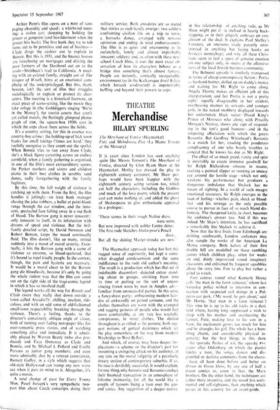The Merchant of Venice (Haymarket)
THEATRE
Merchandise
IIILARY SPURLING
Futz and Melodrama Play (La Mama 'froupe at the Mercury) It is years since London has seen anything quite like Messrs Tennent's The Merchant of Venice, directed by Glen Byam Shaw at the Haymarket. Motley has dressed the play in eighteenth century costumes; Mr Shaw per- haps would have been happier with the eighteenth century acting version too, which cut half the characters, including the Gobbos and much of the love poetry which the present cast can make nothing of, and added the ghost of Shakespeare to give enthusiastic approval in a prologue: `These scenes in their rough Native dress were mine, But now improved with nobler Lustre shine; The first rude Sketches Shakespear's Pencil drew.
But all the shining Master-stroaks are new.'
The Haymarket approach today has lost this rugged sense of superiority, but kept a some- what draggled condescension and the same indifference to the rude old author's meaning. The result is a production which has that air of indefinable discomfort--dejected extras stand- ing about in groups, smirking from time to time or putting on the sort of uncon- vincing frown worn by men in Amplex ads— familiar from unsuccessful parties. In this case, a fancy-dress party: unbecoming modern hair- dos sit awkwardly on period costume, and the clothes themselves are worn with the cramped and sagging gestures of people who would feel more comfortable, at any rate less woefully conspicuous, in street clothes. The diction throughout is as stilted as the posture; both sug- gest notions of genteel daintiness which set the play somewhere on the way from modern Weybridge to West Byflect.
And which, of course, may have deeper im- plications—a scheme on the director's part for mounting a swingeing attack on his audience, at any rate on the moral vulgarity of a peculiarly dreary section of contemporary suburbia. If so, his ruse is devilishly successful. It would explain; for one thing,why Antonio and Bassanio conduct theirfinancial transaction in an atmosphere of fulsome insincerity, for all the world like a couple of tycoons fixing a loan over the gins and' tonics. Any suggestion of a deeper motive in this relationship of any thing rude, as Mr Shaw might put it-- is shelved in hearty back- slapping, or in their gingerly embrace on con- clusion of the deal. It explains Paul Shelley's Lorenzo, an unctuous toady patently unin-
terested in anything but laying hooks on Jessica's moneybags; and why all these Chris- tians seem to feel a spurt of genuine emotion on one subject only, in sneers at the offensive- ness of the local Jewish business community.
The Belmont episode is similarly transposed in terms of cheap contemporary fiction: Portia as husband-hunter, dolled up on daddy's money and waiting for Mr Right to come along. Angela Thorne makes an efficient job of this interpretation, and her Portia is not a pretty sight: equally disagreeable in her strident, overbearing manner to servants and -younger girls, in the naked snobbery displayed towards her unfortunate black suitor—David King's Prince of Morocco who alone, with Priscilla Morgan's Nerissa, shows any sign of respond-
ing to the text's good humour—and in the simpering affectation with which she greets Bassanio. But Geoffrey Whitehead's Bassanio
is a match for her, exuding the ponderous complacency of one who barely troubles to conceal that he knows his due as Mr Right.
The effect of so mutt greed, vanity and spite is inevitably to create immense goodwill for Sir Ralph Richardson--sinuous in mauve, cocking a pointed slipper or running an uneasy eye around the hostile stage —which not only weakens his performance but produces a dangerous imbalance that Shylock has no means of righting. In a world of such meagre emotional resources, Sir Ralph emerges as the man of feeling—whether pain, shock or blood- lust—and his revenge as the only possible course to pursue in face of so much bland dis- honesty. The sharpened knife, in short, becomes the audience's answer too. And if this was indeed Mr Shaw's intention, he has sacrificed a remarkably fine Shylock to achieve it.
Now that the first fruits from Edinburgh are drifting southwards, London audiences may also sample the works of the American La Mama company. Beth halves of their first double bill arc modelled on those rambling games which children play, often for weeks on end, dimly improvised round imaginary characters and enlivened by frequent squabbles about the story line. Fun to play but rather a grind to watch.
Futz centres round what Kenneth Home calls 'the man in the fawn raincoat,' whom last Saturday police wished to interview in con- nection with suspected evil doings in a Pol- perro car park. (`My word, he gets about,' said Mr Home, 'that man in a fawn raincoat.') This time he is up to his old tricks in a dark field where, having long suppressed a wish to
sleep with his mother and to the farmer, Futz, making love to his sow in a barn, the excitement grows too much for him and he strangles his girl. The whole has a bum- bling charm, and considerable physical in- genuity; but the best things in this show ---the sporadic flashes of wit, the squashy PVC piano after Oldenburg on which the pianist tinkles a tune, the songs, dances and dis- gruntled or derisive comments from the chorus
have all been done before and better on Home br Goon Show, by any one of half a do/en comics or, come to that, the Marx brothers. On the other hand, the techniques are rather more inventive, and the mood less senti- mental and self-righteous, than anything which passes in this country for an avant-garde.






























 Previous page
Previous page